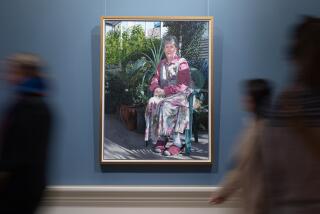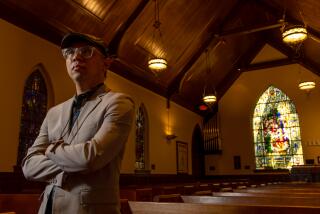Irish Suicide Raises New Issues for Minister
- Share via
BECKLEY, W.Va. — He was once a radio church reviewer in Pittsburgh, offering on-air critiques of houses of worship--their music, their architecture, even their pastors’ sermons.
Before that, he started a ruckus over unsafe sex at South Carolina highway rest areas. He wanted the state to install condom machines.
Now the Rev. George Exoo, who leads two Unitarian Universalist congregations in West Virginia, is making news for being present when a 49-year-old woman took her life in an apartment in Ireland.
Exoo said Rosemary Toole Gilhooley’s Jan. 26 death in Dublin was one of more than 100 he’s been involved with since 1995. It’s part of his work with a group he founded and calls Compassionate Chaplaincy.
Ireland’s national police force is investigating Exoo, who sat at Gilhooley’s side as she took sleep-inducing drugs, smoked a last cigarette, then pulled a helium-filled bag over her head.
The investigation, which began when Gilhooley’s father took her suicide note to police, also involves the FBI, an Irish police spokesman said. The FBI would not confirm an investigation.
Exoo said he conformed his actions to American law. It is not illegal in the United States to sit with people while they kill themselves as long as they procured and administered their own means of death, according to the Hemlock Society, the nation’s oldest and largest right-to-die group. The American Bar Assn.’s Commission on Legal Problems of the Elderly agrees.
Exoo said he does nothing more than sit by a person’s side and give comfort. He acknowledged, however, that if he held a person’s hand--as he said he did Gilhooley’s--while reading a Psalm aloud, it would be more difficult for that person to pull a bag off her head.
Exoo was drawn into the right-to-die movement through the 1983 illness and death of a member of his former congregation in Charleston, S.C. That man’s wife later persuaded him to join the Hemlock Society.
Exoo said he does not seek publicity and he’s “not interested in being a Jack Kevorkian”--the retired pathologist whose public crusade for physician-assisted suicide ultimately landed him in prison on a second-degree murder conviction.
His efforts have put him at odds with the Hemlock Society and his own church’s governing association.
The Hemlock Society referred some people to Exoo until a year ago, but now does not want him using its name, said Ryan Ross, a society spokesman.
“He does what George Exoo thinks is right. We have our standards and policies and they are not in sync,” Ross said. The Hemlock Society, for example, requires clients to prove they are mentally sound and have a terminal illness or irreversible disability.
Exoo, 59, who has no medical or psychological training, says that before he counsels people planning suicide, he must be convinced they are suffering from an incurable illness or disability.
Exoo has said Gilhooley convinced him she had an incurable brain dysfunction. Irish newspapers have reported she suffered only from depression.
Since 1998, the Unitarian Universalist Assn. has supported a terminally ill person’s right to commit suicide. The association parted ways with Exoo in November, although he can still serve his congregations in Beckley and Lewisburg.
Association spokesman John Hurley would not discuss Exoo’s situation.
Exoo explained, “They did not like the design of Compassionate Chaplaincy, and I was not pleased with what they wanted me to do.”
Some advocates for the disabled also criticize Exoo’s work.
“We see it not as compassion, but as contempt for our lives,” said Diane Coleman, who uses a wheelchair because of a neuromuscular disorder and is president of the advocacy group Not Dead Yet in Forest Park, Ill. “Why is suicide a bad thing for everybody else except us?”
Exoo was born and raised a Methodist in suburban Cleveland. After graduating from Boston’s Emerson College in 1964, he earned a graduate degree from Harvard Divinity School and studied toward his doctorate in music history at UC Berkeley. He taught sociology at several colleges until he was ordained into the Unitarian Universalist ministry in 1973. He led congregations in Charleston and Myrtle Beach, S.C., among others, and has led the new River Fellowship in Beckley part-time since 1997. He also gathered a congregation in Lewisburg.
His work as an AIDS activist in Charleston drew fire and in part led to his resignation from the church he served for 10 years.
Exoo got a grant to study how Interstate 26 rest areas were used for homosexual sex and publicized his findings, hoping it would lead to a safe-sex initiative. He should have anticipated the police crackdown that followed instead, Robinson said.
From South Carolina, Exoo went to West Virginia to help establish a hospice house at a Hare Krishna community. There he met Thomas McGurrin, a Krishna monk; the two have been companions ever since.
They moved to Pittsburgh, where Exoo supported himself caring for a disabled man and being “The Church Man” on WQED-FM, reviewing churches, synagogues, mosques and meetinghouses.
While in Pittsburgh in 1995, Exoo said, he assisted in his first suicide. George Koss, who had amyotrophic lateral sclerosis, or Lou Gehrig’s disease, and his wife, Josephine, contacted Exoo through the Hemlock Society.
After George Koss’ death, Exoo and Josephine Koss formed Compassionate Chaplaincy, which he said helps those whom the Hemlock Society and other groups turn away.
Exoo and McGurrin said they have counseled and helped many people who don’t kill themselves, buying medication for some and taking others to doctors.
One such person, a woman who has put off her plan to commit suicide since befriending Exoo, said, “He has never pushed anybody into anything they don’t want.”
Exoo gets support for his assisted suicide work among the 24 members of his congregation in Beckley, a city of about 17,000 in southern West Virginia’s coal fields.
“I feel he is performing a very necessary . . . service for people,” church member Ed Brown said.
“He’s one of the most compassionate, selfless people we’ve ever known,” said another, Beverly Kinraide.
His main source of income is the $375 a month he receives from the Beckley congregation. He asks for money from those who seek his help with suicide.
Exoo said he has no intention of stopping his work.
“I’ll go as long as I can go; as long as God gives me the strength to do it, I’ll do it.”
But, he said, “I’ll never go back to Ireland.”
More to Read
Sign up for Essential California
The most important California stories and recommendations in your inbox every morning.
You may occasionally receive promotional content from the Los Angeles Times.













